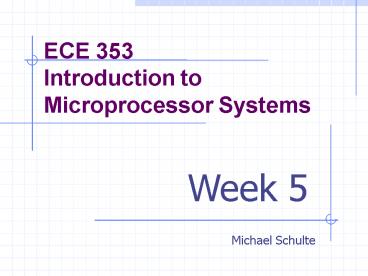ECE 353 Introduction to Microprocessor Systems - PowerPoint PPT Presentation
1 / 21
Title:
ECE 353 Introduction to Microprocessor Systems
Description:
In an embedded system, the code area is usually in nonvolatile memory (ROM) ... 1. Use a lookup table to get a 32-bit mask that will be used to clear individual ... – PowerPoint PPT presentation
Number of Views:213
Avg rating:3.0/5.0
Title: ECE 353 Introduction to Microprocessor Systems
1
ECE 353Introduction to Microprocessor Systems
Week 5
- Michael Schulte
2
Topics
- ARM7TDMI Programming
- LUTs
- Branches and Loops
- Structured Programming
- Flowcharts
- Stacks
- Hardware versus Memory Stacks
- ARM7TDMI Stack Management
3
Wrapping Up
- Quiz 1 will be held Wednesday, 2/27 from 715 to
830 pm in room 2345 EH. - Coverage will be over modules 1 and 2.
- Calculators are not permitted. You may have a 3x5
card with handwritten notes. - The instruction set documentation will be
provided. - Average on HW2 is 91.4.
- Office hours M 300 to 430 and W 230 to 330.
TA Tuesday 400 to 500.
4
Quiz 1 Basic Format
- Multiple choice questions
- Short answer questions explaining things,
writing very short code, simple problems - Design type question (e.g., memory maps)
- Writing ARM Assembly code
- Go over Education Objectives for modules 1 and 2
- Also useful to review homeworks, class notes, and
readings
5
Look-Up Tables
- In an embedded system, the code area is usually
in nonvolatile memory (ROM) - Data in the code area will also be placed in ROM
so the data is constant - Look-up tables (LUTs) are used to translate a
value from one domain to another when - There is no convenient mathematical relationship
between the two domains - The calculations are too expensive for the
application constraints
6
LUT Examples
- Exercises Write code fragments that
- 1. Use a lookup table to get a 32-bit mask that
will be used to clear individual bytes as
directed by a 4-bit value (i.e. 2_1001 means that
we want to clear the middle two bytes and
preserve the most/least significant bytes) - 2. Use a lookup table to get the square root of
an unsigned half-word value - Disassembly fragment
- In both cases,
- Assume that the value to convert is in R0, and
place the result in R1 - Identify how large the complete data table will be
7
Branches
- Branches redirect program flow by loading a new
PC value - In many processors, a branch that does not return
is called a jump - ARM7TDMI branch instructions
- B target_address
- Target_address is a label
- Instruction encodes a signed 24-bit offset
- BX
- Branch address is in a register
- Can be used to jump to Thumb code
- Jump tables
- Be sure index is bounds-checked!
8
Conditional Branches and Looping
- Conditional branches allow program flow to change
in response to conditions - Action is based on current state of flags
- Prior instruction must be used to set flags
- Can use backwards conditional jumps to create a
loop that can be terminated - - By a condition
- After a predetermined number of iterations
- Or a combination of both
- Looping examples
- Incrementing loops
- Decrementing loops
9
Implementing Structured Programming Constructs
- Structured programming basics
- One entry point, one exit point per subroutine
- Based on three basic control structures
- Sequence
- Selection
- If, If/Else, Switch/Case
- Repetition
- While
- Do-While
- Flowchart Basics
- Programming Exercise
10
Stack Implementation
- The stack is a LIFO data structure
- What is the stack used for?
- Two basic stack operations
- PUSH
- POP (aka PULL)
- Hardware stacks vs. memory stacks
- Hardware stack
- Memory stack
- Stack pointer (SP)
- Stack topologies and SP operation
11
ARM7TDMI Stack Operation
- By convention, the stack pointer is R13
- ARM stack terminology
- Empty versus full
- Ascending versus descending
- Allocating stack space
- SP initialization
- Stack operations
- LDR/STR
- LDM/STM
- PUSH/POP
- ARM operating modes and stacks
12
Wrapping Up
- Homework 3 is due Friday, 3/7
- Quiz 1 will be held Wednesday, 2/27 at 715pm in
room 2345 EH. - Coverage will be over modules 1 and 2.
- Calculators are not permitted. You may have a 3x5
card with handwritten notes. - The instruction set documentation will be
provided. - If you have a conflict, please send me the
details by email.
13
SP Init Disassembly Dump
24 LDR R13, (Stack_Mem) ? EA 0x000800F4
E59FD058 LDR R13,PC,0x0058 25 LDR
R13, (Stack_Top-4) ? ED 0x000800F8 E59FD058
LDR R13,PC,0x0058 26 LDR R13,
(Stack_Mem-4) ? FA 0x000800FC E59FD058 LDR
R13,PC,0x0058 27 LDR R13,
(Stack_Top) ? FD 0x00080100 E59FD058 LDR
R13,PC,0x0058 . . 0x00080154 00010000 DD
0x00010000 0x00080158 000100FC ???EQ
0x0008015C 0000FFFC ???EQ 0x00080160
00010100 ANDEQ R0,R1,R0,LSL 2
14
PIC16F84 Hardware Stack
15
Jump Tables
start MOV R0, ??? assume index is in R0
MOV R1, jmptbl get base address LDR R0,
R1,R0,LSL 2 do look-up BX R0 branch to
target task0 stub NOP B start task1
stub NOP B start jmptbl DCD task0,
task1 ...
16
Hardwarefor Sample Program
17
B Instruction Reference
- Syntax
- B
- RTL
- if (cond is true)
- PC ? PC offset
- Flags are not affected
18
BL Instruction Reference
- Syntax
- BL
- RTL
- if (cond is true)
- R14 ? next instruction address
- PC ? PC offset
- Flags are not affected
19
BX Instruction Reference
- Syntax
- BX
- RTL
- if (cond is true)
- T flag ? Rm0
- PC ? Rm 0xFFFFFFFE
- Flags are not affected
- In ARM v5 and higher, there is also a BLX
instruction
20
JacuzziFlowchart
21
Disassembly Fragment
57 ADR R2, sqrt_LUT 0x00080104
E24F2024 SUB R2,PC,0x00000024 58
LDR R1, sqrt_MASK
0x00080108 E51F1020 LDR R1,PC,-0x0020































